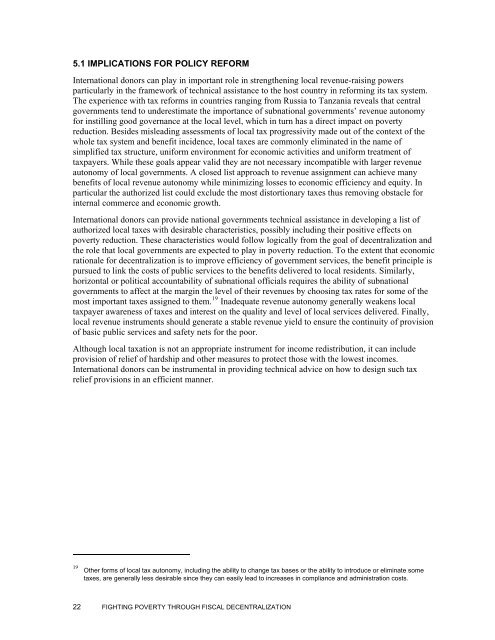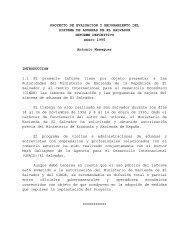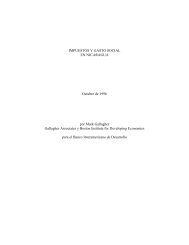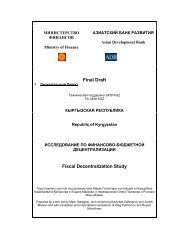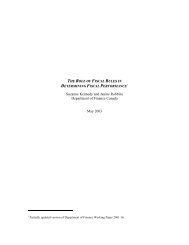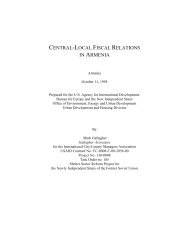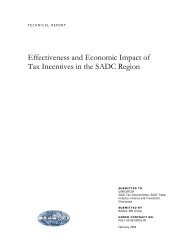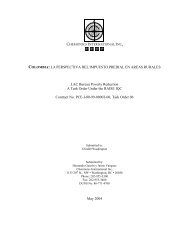FIGHTING POVERTY THROUGH FISCAL DECENTRALIZATION
FIGHTING POVERTY THROUGH FISCAL DECENTRALIZATION
FIGHTING POVERTY THROUGH FISCAL DECENTRALIZATION
Create successful ePaper yourself
Turn your PDF publications into a flip-book with our unique Google optimized e-Paper software.
5.1 IMPLICATIONS FOR POLICY REFORM<br />
International donors can play in important role in strengthening local revenue-raising powers<br />
particularly in the framework of technical assistance to the host country in reforming its tax system.<br />
The experience with tax reforms in countries ranging from Russia to Tanzania reveals that central<br />
governments tend to underestimate the importance of subnational governments’ revenue autonomy<br />
for instilling good governance at the local level, which in turn has a direct impact on poverty<br />
reduction. Besides misleading assessments of local tax progressivity made out of the context of the<br />
whole tax system and benefit incidence, local taxes are commonly eliminated in the name of<br />
simplified tax structure, uniform environment for economic activities and uniform treatment of<br />
taxpayers. While these goals appear valid they are not necessary incompatible with larger revenue<br />
autonomy of local governments. A closed list approach to revenue assignment can achieve many<br />
benefits of local revenue autonomy while minimizing losses to economic efficiency and equity. In<br />
particular the authorized list could exclude the most distortionary taxes thus removing obstacle for<br />
internal commerce and economic growth.<br />
International donors can provide national governments technical assistance in developing a list of<br />
authorized local taxes with desirable characteristics, possibly including their positive effects on<br />
poverty reduction. These characteristics would follow logically from the goal of decentralization and<br />
the role that local governments are expected to play in poverty reduction. To the extent that economic<br />
rationale for decentralization is to improve efficiency of government services, the benefit principle is<br />
pursued to link the costs of public services to the benefits delivered to local residents. Similarly,<br />
horizontal or political accountability of subnational officials requires the ability of subnational<br />
governments to affect at the margin the level of their revenues by choosing tax rates for some of the<br />
most important taxes assigned to them. 19 Inadequate revenue autonomy generally weakens local<br />
taxpayer awareness of taxes and interest on the quality and level of local services delivered. Finally,<br />
local revenue instruments should generate a stable revenue yield to ensure the continuity of provision<br />
of basic public services and safety nets for the poor.<br />
Although local taxation is not an appropriate instrument for income redistribution, it can include<br />
provision of relief of hardship and other measures to protect those with the lowest incomes.<br />
International donors can be instrumental in providing technical advice on how to design such tax<br />
relief provisions in an efficient manner.<br />
19 Other forms of local tax autonomy, including the ability to change tax bases or the ability to introduce or eliminate some<br />
taxes, are generally less desirable since they can easily lead to increases in compliance and administration costs.<br />
22 <strong>FIGHTING</strong> <strong>POVERTY</strong> <strong>THROUGH</strong> <strong>FISCAL</strong> <strong>DECENTRALIZATION</strong>


